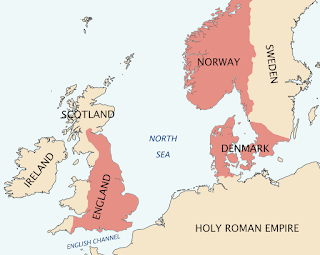Canute (Cnut in Old Norse or Canute Cyning in Anglo Saxon), was the sort of man that - like Alfred the Great - comes along once in in a generation. Medieval historian Norman Cantor has referred to him as "the most effective king in Anglo-Saxon England" - ironic in that he himself was not Anglo-Saxon at all.
Canute inherited inherited Anglo-Saxon England from his father upon the his death in 1014 A.D.; driven out supporters of King Æthelred, he returned in 1015 A.D. and upon the death of Æthelred, continued the struggle with Æthelred's son Edward Ironsides, supported by his older brother King Harald of Demark and variety of troops including Danes, Poles, Swedes, and Norwegians. Likely this army was composed largely of mercenaries - not coming to settle, but to conquer and get well paid for it.
The campaign climaxed in the Battle of Assandun in 18 October 1016 A.D., where the Anglo-Saxons were defeated when a key leader left the Anglo-Saxon side at a critical moment, causing defeat. Canute, still apparently respecting Edmund's battle prowess (or perhaps still concerned about his position) signed a treaty with Edmund separating England between them, Canute hold all land north of the Thames, Edmund the land south of it. Could there have been another period like that of Alfred the Great, where Wessex would again reconquer all of England? We will never know, because a month later Edmund died. Canute became the sole ruler of England and was crowned as such in 1017 A.D.
To tighten his control, Canute executed or drove off any remaining members of the house of Wessex and married Emma of Normandy, the widow of Æthelred. In 1018 he gathered the colossal sum of 82,500 pounds of gold and silver as a Danegeld to pay off most of his fleet and send them home, leaving himself a small (40 ship fleet) - with this, the Viking threat to England was almost completed abated and the country in a position to enjoy peace and prosperity as it had not since the earliest days of Æthelred. He also reorganized the administrative rule of England: Ealdormen were replaced by Earl (Anglo-Saxon earl) and the territories made larger:
In 1027 A.D., Canute was invited to attend the accession of the Holy Roman Emperor Conrad the II in Rome. This was a triumphal trip for Canute as he was now recognized among the greatest kings of Europe. He met with the pope and negotiated down the cost of a bishopric, complained about the tolls levied of pilgrims, and hit it off with the Emperor - so much so, that the Emperor granted him a strip of land that for years had been contested between the two powers.
In 1028 A.D., fresh off his success at Rome, Canute invaded Norway, causing the then current king Olaf Haraldsson to flee . Crowned the same year, he now claimed himself as King of England, Denmark, Norway, and part of Sweden. Unfortunately for Canute his conquest of Norway was not as successful as his conquest of England: plagued by the unexpected death of the jarl designated to managed the kingdom in his absence, his attempts to rule through his wife and older son did not yield the same results as England.
Works cited:
Brooke, Christopher: From Alfred to Henry III 871-1272. Norton Library: USA, 1961.
Trevelyan, G.M.: History of England Volume 1: From the Earliest Times to the Reformation. Anchor Books: USA, 1953



Excellent post TB, those maps really help. "What If" in history is always fun to think about.
ReplyDeleteNylon12, this is on of those "what ifs" that really makes me wonder and I had never thought of before. Would there have been the equivalent of the British Empire - but would it have Anglo-Norse?
DeleteI suspect playing what if with history has sold many a fictional book.
ReplyDeleteIt had Ed - and not just history. I am reading a book by Larry Niven and Jerry Pournelle called Legacy of Heorot, which is a retelling of Beowulf in a science fiction setting.
Delete"What if" is the inspiration for historical fiction. :)
ReplyDeleteIt makes for fun reading Leigh. Harry Turtledove replanted a Roman Legion in a Byzantine-style world - it was a bit odd, but made for good fun.
DeleteI read that as Swine Canut's Son. I wondered who named him....
ReplyDeleteVery interesting. My people come from that area. Neat to know what the very great grands were doing.
Interestingly, the original word from which the name is derived means "youth, young man, male attendant".
DeleteIt is interesting to see what our ancestors were going through. Helps with perspective, if nothing else.